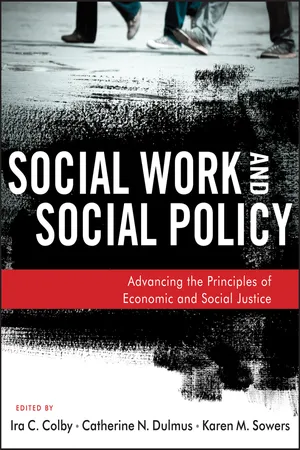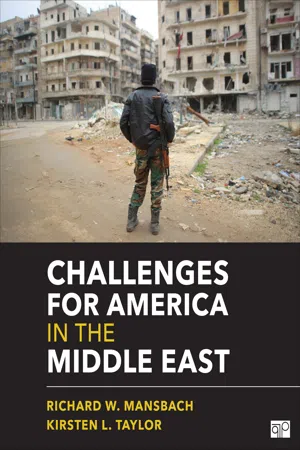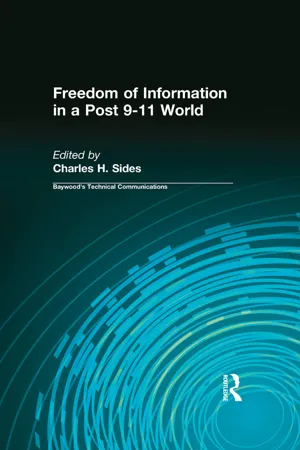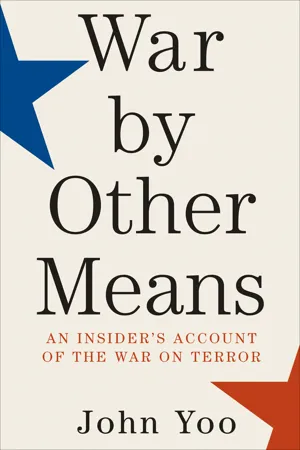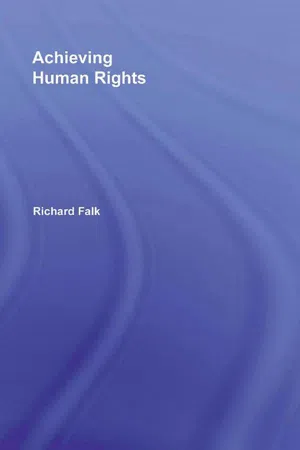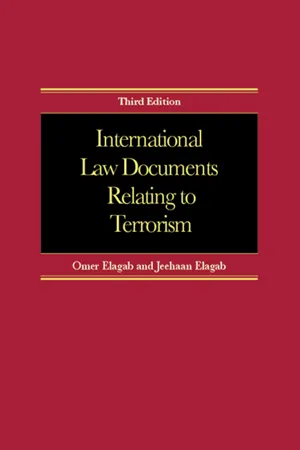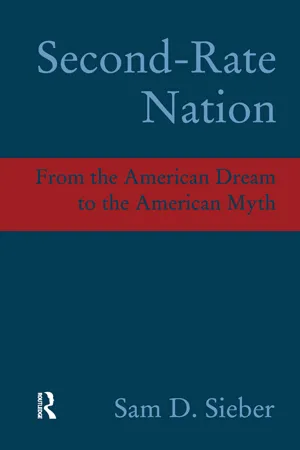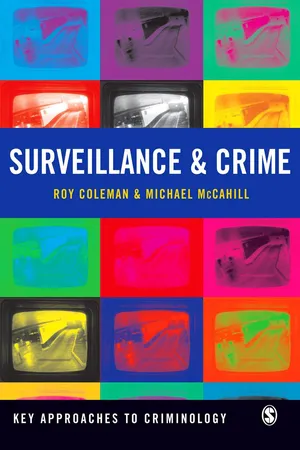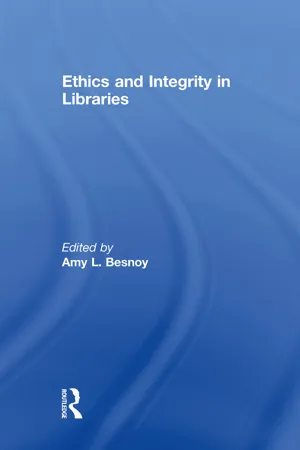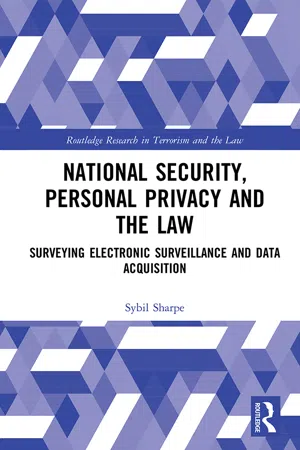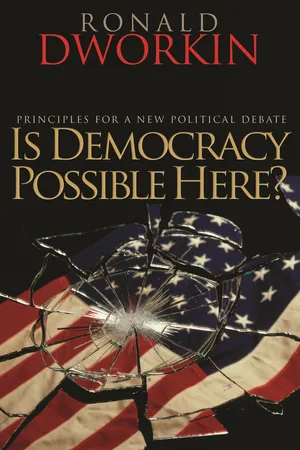Politics & International Relations
The Patriot Act
The Patriot Act is a U.S. law passed in response to the 9/11 terrorist attacks, aimed at enhancing the government's ability to combat terrorism. It expanded surveillance powers, allowed for increased information sharing between government agencies, and granted broader authority for law enforcement to investigate and detain suspected terrorists. The Act has been both praised for its role in national security and criticized for potential violations of civil liberties.
Written by Perlego with AI-assistance
Related key terms
Related key terms
1 of 4
Related key terms
1 of 3
12 Key excerpts on "The Patriot Act"
- eBook - ePub
Social Work and Social Policy
Advancing the Principles of Economic and Social Justice
- Ira C. Colby, Catherine N. Dulmus, Karen M. Sowers(Authors)
- 2012(Publication Date)
- Wiley(Publisher)
In response, the U.S. Congress passed the “Uniting and Strengthening America by Providing Appropriate Tools Required to Intercept and Obstruct Terrorism Act,” or the USA PATRIOT Act, Public Law 107–56. The U.S. Patriot Act, passed with virtually no public debate and signed into law six weeks after the tragedy of 9/11, redefined the public's response to terrorism. In addition, the act gave broad and sweeping powers to the federal government, through its various law enforcement agencies, to investigate, apprehend, and detain suspected terrorists. These powers, somewhat unprecedented in American history, even though similar acts and practices were created during times of strife in the country's past—such as the Alien Act of 1798, the suspension of habeas corpus by President Lincoln during the Civil War, and the Espionage Act of 1917—forced all social institutions to examine how they responded to the terrorist threat. Unlike previous attempts directed toward the nation's enemies, The Patriot Act was directed toward an unknown target: would-be terrorists.Coupled with advancing technologies, terrorists have many tools to pursue bombings, kidnappings, and mass destruction. The 19 men, for example, who attacked the World Trade Center were from all over the world, and the extremists that they worked for in planning the attack were headquartered in Afghanistan, an initial target of U.S. forces in response to the 9/11 tragedy. Yet, questions still remain regarding homeland security, and the ability of the federal government to prevent attacks and to pursue terrorists both in this country and around the world. The U.S. Patriot Act is designed, according to its supporters, to give law enforcement more effective weapons to address domestic terrorism and secure the homeland.For the purposes of this chapter, we will show how the U.S. Patriot Act, through its implementation over the past 10 years, has changed the nature of the relationship between the federal government and the citizenry. This change is most directly felt within the thousands of agencies that represent the criminal justice system. These organizations—police, prosecution, courts, and corrections—have all been directly or indirectly affected by the U.S. Patriot Act. The most significant change has occurred in law enforcement, especially federal law enforcement, where broad powers have been given to investigate, detect, apprehend, prosecute, and detain terrorists and other criminals. These changes have had a profound impact on the quality of life for Americans and immigrants alike. Through our zeal to protect the homeland, we have passed laws and allowed criminal justice agencies to enter our lives in more invasive and insidious ways. Law enforcement agencies, like the terrorists they are pursuing, also have the power of modern technologies at their fingertips. The ability to observe and detect suspicious movements of criminals and terrorists is remarkably accurate and frightening at the same time. Cities across the country have adopted practices and employed technologies that allow government agencies to watch over citizens without them even knowing about it and outside of public review and possible criticism (American Civil Liberties Union, 2003). Most importantly, with the passage of the U.S. Patriot Act, we have created two systems of justice in this country, one that is transparent in its operations and one that is not transparent in its operations. - eBook - ePub
- Richard W. (Wallace) Mansbach, Kirsten L. Taylor(Authors)
- 2016(Publication Date)
- CQ Press(Publisher)
99 Specific provisions of The Patriot Act included the following:- Allowed the government to use electronic surveillance to gather intelligence about suspected terrorist-related activities in ways such as wiretaps that had previously been available for investigating other criminal activities;
- Legalized the use of “roving wiretaps” linked to individual suspects rather than specific phones to prevent suspects from evading surveillance by changing cell phones and/or moving from place to place;
- Allowed the government to obtain a secret court order for the personal and business records of suspects—that is, to obtain “tangible things” such as “books, records, papers, documents, and other items” ranging from purchases in stores or online, to hotel records, to credit card and library records;
- Removed barriers preventing different agencies—law enforcement, defense, and intelligence—from sharing information;
- Enabled officials to obtain a search warrant wherever terrorism-related activity was believed to have occurred;
- Prohibited harboring terrorists; and
- Eliminated the statute of limitations for terrorism crimes.
The broad surveillance authority granted to agencies by The Patriot Act attracted growing criticism at home and abroad after Edward Snowden revealed to a British newspaper, The Guardian, the existence of a highly classified program by which America’s National Security Administration (NSA) was carrying out a vast covert electronic surveillance program within the United States. Snowden claimed that his position as “infrastructure analyst” for the government contractor Booz Allen Hamilton granted him “access to lists of machines all over the world the NSA hacked.”100 The program existed by virtue of the 1978 Foreign Intelligence Surveillance Act (FISA), which allowed eavesdropping on foreigners as well as Americans thought to be “agents of foreign powers” (suspected terrorists), as amended by section 215 of The Patriot Act (its “business records” provision) and the 2008 FISA Amendments Act. Meant to apply to those suspected of terrorist-related activities, the surveillance program had become increasingly sophisticated after 2005. It had also been expanded by a ruling of the secret, eleven-member Foreign Intelligence Surveillance Court (FISC) that “relevant” material could encompass entire databases of records on millions of persons. In a series of cases, the FISC expanded the “special needs” doctrine allowing an exception to the Fourth Amendment’s requirement of a warrant for searches and seizures in the event of imminent danger to the public. Initially applied only to drug testing of railway workers, it was expanded to include terrorism suspects. “It seems like a legal stretch,” declared a national security law expert. “It’s another way of tilting the scales toward the government in its access to all this data.”101 Thus, only 12 of 34,000 surveillance requests made to the secret court were refused.102 - eBook - ePub
- Charles H Sides(Author)
- 2017(Publication Date)
- Routledge(Publisher)
Bush signed into law the USA PATRIOT Act of 2001. He described the law as an “… essential step in defeating terrorism, while protecting the constitutional rights of all Americans” [ 2 ]. The act’s title is an acronym for U niting and S trengthening A merica by P roviding A ppropriate T ools R equired to I ntercept and O bstruct T errorism. The law is actually a compendium of several elements of law. Largely these amend previously existing law, thus changing the meanings of and protections provided under these laws. It should be noted that when the act was passed by Congress on October 24, 2001, a majority in the House and Senate had not had the completed law with sufficient time to read the bill. Some did not receive the complete text until after voting for the law [3, p. 1]. While it is not unusual for members of Congress to vote on a bill without having read it, they usually do so only after members of their staff have read the bill and recommended action. The fact that so few members of Congress voted with actually having information about the completed text is an indication of the pressure placed on the legislature to take responsive action to the September 11 attacks. While the law itself runs over 300 pages, and affects a wide array of civil liberties ranging from fair trial rights through search and seizure guarantees, the elements of the law that address information issues may be summarized in a few pages. A crucial part of the USA Patriot ACT, Section 215, grants the government, specifically the FBI, the power to order any person or entity to turn over “any tangible things” as long as the agency asserts that the order serves an authorized investigation related to terrorism [ 4 ]. The language of the bill is sufficiently nonspecific to allow the government access to material ordinarily protected under privacy and First Amendment rights - eBook - ePub
War by Other Means
An Insider's Account of the War on Terror
- John Yoo(Author)
- 2007(Publication Date)
- Atlantic Monthly Press(Publisher)
Recent history certainly has to make anyone wary of increased state police powers in any form. Yet it is also true that American law and politics have evolved since the days of the Alien and Sedition Acts, which prohibited criticism of the government during the 1798 Quasi-War with France, or the Palmer raids, which rounded up communists after World War I. Abuses that occur today are more likely to be isolated and individual acts—mistakes—rather than wholesale deprivations of civil liberties. And at the risk of seeming Pollyannaish, it is worth noting that our career government officials are, by and large, keenly respectful of law and the Bill of Rights—notwithstanding bad-cop stereotypes that stir media excitement. It is hard to imagine any President ordering the surveillance of political opponents today without numerous government officials reporting it to the press and to Congress.Many legal academics have warned in books, articles, and hearings that The Patriot Act endangers civil liberties. Most of this criticism amounts to the valid but generalized point that any increase in national security might potentially infringe on civil liberties. The rhetoric intensified with the 2004 presidential campaign. Former Vice President Al Gore, calling for The Patriot Act’s repeal, accused the Bush administration of using “fear as a political tool to consolidate its power and to escape any accountability for its use.” Then-candidate Howard Dean denounced the Act as “morally wrong” and “shameful.” In debate on the House floor Dennis Kucinich claimed that “it has become crystal clear that this administration is currently and will continue to abuse, attack and outright deny the civil liberties of the people of this country in defiance of our constitution.”6 The American Civil Liberties Union convinced several city councils to pass symbolic resolutions to disobey the Act and some librarians to file lawsuits against its expanded surveillance powers.For its part, the Bush administration defended The Patriot Act as a crucial expansion of executive authority to “detect terror cells, disrupt terrorist plots and save American lives.”7 - eBook - ePub
- Richard Falk(Author)
- 2008(Publication Date)
- Routledge(Publisher)
The 2006 Act renews the controversial “sneak and peak” provision that empowers the government to gather information from a variety of sources: intercepts of telephone and Internet communications, access to medical and tax records, scrutiny of book purchases and library borrowings. There are various provisions exempting some of these surveillance and search procedures from the requirement of a prior warrant or of notification to the target of investigation and suspicion. The judge issuing the warrant may allow the delay in notification under a variety of circumstances when there exists a risk of “endangering the life or physical safety of an individual; flight from prosecution; destruction of or tampering with evidence; intimidation of potential witnesses; or otherwise seriously jeopardizing an investigation or unduly delaying a trial.” These procedures are handled by the Foreign Intelligence Surveillance Court, which has a record of deference to governmental requests, instead of a normal federal or state court. And the basis for granting requests is based on a claim of “reasonable cause” rather than the more restrictive “probable cause.” There are some measures in the 2006 version of The Patriot Act that allow challenges to “gag orders” and place some burdens on government agents making requests for intrusions on privacy. For instance, FBI agents who want to search bookstore or library records must now gain explicit permission from one of three designated high government officials.In essence, The Patriot Act gives to the government wide powers with a serious potential of abuse that has alarmed civil libertarians, especially as this authority has been applied to immigrant suspects detained secretly without charges for long periods of time. The statutory language, which has not been judicially tested as yet, relies on very broad definitions of prohibited activity that could be interpreted to intimidate, and even punish, normal political action. Such legislation would have been impossible to enact in the absence of the post-9/11 climate of fear and anger, an atmosphere that has been sustained by periodic alarms uttered by high officials. The linking of counter-terrorism with the war on terror has been relied upon by the Bush administration and the courts to defer to governmental claims that rely on a national security rationale.Conclusions
The threat to civil liberties, human rights, and the rule of law associated with developments since 9/11 is complicated by the outlook of the Bush presidency and the deliberate confusion drawn between counter-terrorism and a broader foreign policy agenda unlikely to generate domestic support unless fused in the public mind with responding to terrorist dangers. It is also clear that an authoritarian tendency has been activated, which was partly a dormant predisposition of neoconservative leadership and partly a response to the traumatic attacks of 9/11. This conjuncture has resulted in a series of controversial intrusions on rights, quite unhelpful with respect to genuine counter-terror goals of achieving security without disrupting the democratic fabric of society. In the instance of torture and reliance on cruel, inhuman, and degrading treatment of various categories of detainees the debate as to utility has not been completely settled, although there is certainly no firm evidence that such abuse produces sufficient reliable and strategically useful information to offset the harm done. - Omer Elagab, Jeehaan Elagab(Authors)
- 2007(Publication Date)
- Routledge-Cavendish(Publisher)
12 ACTION BY THE UNITED STATESDOI: 10.4324/9780203088784-121. CRS Report for Congress the USA PATRIOT Act: A Sketch
Summary
Congress passed the USA PATRIOT Act (the Act) in response to the terrorists’ attacks of September 11, 2001. The Act gives federal officials greater authority to track and intercept communications, both for law enforcement and foreign intelligence gathering purposes. It vests the Secretary of the Treasury with regulatory powers to combat corruption of U.S. financial institutions for foreign money laundering purposes.It seeks to further close our borders to foreign terrorists and to detain and remove those within our borders. It creates new crimes, new penalties, and new procedural efficiencies for use against domestic and international terrorists. Although it is not without safeguards, critics contend some of its provisions go too far. Although it grants many of the enhancements sought by the Department of Justice, others are concerned that it does not go far enough.The Act originated as H.R.2975 (The Patriot Act) in the House and S.1510 in the Senate (the USA Act). S.1510 passed the Senate on October 11, 2001, 147 Cong.Rec. S10604 (daily ed.). The House Judiciary Committee reported out an amended version of H.R. 2975 on the same day, H.R.Rep.No. 107–236. The House passed H.R. 2975 the following day after substituting the text of H.R. 3108, 147 Cong.Rec. H6775–776 (daily ed. Oct. 12, 2001). The House version incorporated most of the money laundering provisions found in an earlier House bill, H.R. 3004, many of which had counterparts in S.1510 as approved by the Senate. The House subsequently passed a clean bill, H.R. 3162 (under suspension of the rules), which resolved the differences between H.R. 2975 and S.1510, 147 Cong.Rec. H7224 (daily ed. Oct. 24, 2001). The Senate agreed to the changes, 147 Cong.Rec- eBook - ePub
Second-Rate Nation
From the American Dream to the American Myth
- Sam D. Sieber(Author)
- 2015(Publication Date)
- Routledge(Publisher)
This law was passed on October 25, 2001, “with virtually no public hearing, and … accompanied by neither a conference nor a committee report,” according to a report of the Center for Constitutional Rights. 2 The vote in the House was 356 to 66, and in the Senate it was 98 to 1. The law, known as The Patriot Act, was signed by the president on the following day. One analyst of the law characterized it in the following terms: “the United States intelligence community put together a laundry list of provisions designed to patch perceived holes in the pastiche of security laws in their arsenal and to grant to the FBI and Justice Department the same sorts of freewheeling intelligence gathering powers at home that the CIA has employed abroad for years.” 3 According once again to the Center for Consti-tutional Rights: The War on Terror has seriously compromised the First, Fourth, Fifth and Sixth Amendment rights of citizens and non-citizens alike - eBook - ePub
Language, Symbols, and the Media
Communication in the Aftermath of the World Trade Center Attack
- Robert E., Jr. Denton(Authors)
- 2017(Publication Date)
- Routledge(Publisher)
It allows a single federal district court to authorize the “trapping” and tapping of phone numbers anywhere in the United States. 20 These “roving taps” allow interception of electronic evidence such as e-mail and a history of numbers called from or to tapped phones and e-mail. The legislation gives wider latitude to the special court that authorizes wiretaps on suspected agents of foreign powers (Lichtblau 2001, A3). The legislation allows information concerning foreign agents in the United States to be shared among government agencies. 21 The legislation allows the Immigration and Naturalization Service to detain aliens up to seven days. 22 It permits the attorney general to detain “terrorist aliens” and expands the definition of terrorist activity. The district court of the District of Columbia has been given exclusive jurisdiction over such cases. The legislation ends the statute of limitation on the newly defined terrorist activities and increases the maximum sentence to life imprisonment. 23 Finally, the new law bans possession of biological agents that pose a threat to national security unless the possession would serve peaceful purposes. The USA Patriot Act was drafted by the White House with the help of John Ashcrofťs Department of Justice. In the Congress it was considered by the House Judiciary Committee which reported it out on 36 to none vote. In the Senate it was also favorably reported to the floor as a 187-page document; the Senate voted in favor 96 to l. 24 Amendments by Senator Russell Finegold (D-Wis.) to protect the rights of “innocent” people were defeated; he cast the lone dissenting vote to the legislation in the Senate. During the debate, Senator Orrin Hatch (R-Utah) argued that the government cannot guarantee total protection of the public “when you have people willing to commit suicide to do us harm. … [Those who argue for weakening this law should consider] “the loss of civil liberties of those who died” on September 11 (Jackson 2001, A13) - eBook - ePub
- Roy Coleman, Michael McCahill(Authors)
- 2010(Publication Date)
- SAGE Publications Ltd(Publisher)
Chapter 2 . The aim of ‘pre-empting the threat of terrorism through disruption, restriction and incapacitation’ are also evident in restrictions on association with groups defined as terrorist and ‘the criminalization of a wide range of conduct, not necessarily linked to any violent act’ (McCulloch and Pickering, 2009: 633). For Ericson (2007b), this has shifted surveillance and policing to a logic dominated by prevention at all costs and promoted practices that undermine the maxim of ‘innocent until proven guilty’ enshrined in due process.However, the rapid introduction of new legislation and surveillance practices in response to ‘terror’ is not an entirely new phenomenon. Consider the UK reaction to Feinian bombings in 1883, for example, when Parliament introduced the Explosive Substances Act, or the introduction of new legislation and surveillance practices in response to the ‘troubles’ in Northern Ireland during the 1970s. The Prevention of Terrorism (Temporary Provisions) Act (PTA) 1974 was subject to a mere 17 hours of debate in the House of Commons before its new powers were approved. In this instance, ‘Parliamentary debate was driven by the public outrage caused by the Birmingham pub bombings which resulted in the deaths of 21 people and the injury to a further 180’ (The Guardian, 11 September 2002). As Paddy Hillyard (1993: 2) has pointed out, the British state’s response to the ‘troubles’ in Northern Ireland during the 1970s constituted ‘part of a much longer line of exceptional measures directed against Irish people’. Indeed, measures such as the PTA consolidated a much longer historical trajectory in constructing the Irish community in Britain as ‘a suspect community’ and ‘subject to wide powers of examination, arrest and detention’ (1993: 257). Thus, as McCulloch and Pickering have argued, it is important to connect the policing and surveillance strategies indicative of a ‘new terrorism’ with the latter’s ‘historical antecedents’. Pre-emptive strategies of containments, disruption and aggressive policing connect ‘to the long established history of liberal democracies to deny rights to identifiable groups both at home and in “their” colonies on the basis of a wholly imaginary inferiority or dangerousness’ (2009: 639). Similarly, Brown (2002) has argued that strategies of excessive and ‘exceptional’ surveillance and punishment date from the nineteenth-century colonial context (in British-controlled India, for example), and connect to contemporary strategies in that ‘severe, repressive penal practices sustained by images of the “criminal other”’ remain ‘central to modern states’ development - eBook - ePub
- Amy Besnoy(Author)
- 2013(Publication Date)
- Routledge(Publisher)
2 was passed to address the rampant abuses of counter-intelligence gathering by government agencies, most notably the FBI’s COINTELPRO illegal wiretapping of groups and individuals opposing American intervention in Vietnam. FISA created a context for Congressional oversight of those agencies tasked with collecting and analyzing intelligence in the name of national security, but through a system separate from ordinary law enforcement. Title III and its probable cause threshold remained intact, while FISA regulated the government’s accumulation of data in the investigation of non-domestic parties using standards that do not require the party to be so much as suspected of criminal activity but merely a foreign power or an agent of said power. FISA also created an exceptional legal entity, the Foreign Intelligence Surveillance Court, made up of eleven judges from various federal district courts who are appointed to the FISC by the Chief Justice of the Supreme Court. These magistrates review surveillance authorization requests from the Attorney General. Once approved, records of these cases may not be disclosed even to those parties who face prosecution based on evidence gathered under these FISA orders.The 1993 car bombing at the World Trade Center in New York City and the 1995 destruction of the Murrah Federal Building in Oklahoma City sharpened the national focus on terrorism, both domestic and foreign. The federal government’s primary response was the Antiterrorism and Effective Death Penalty Act3 in 1996, which removed habeas corpus protection for non-citizens, expanded executive power to brand individuals or groups as “terrorist” and criminalize their ability to raise funds, and reinstated prior restraint on the privileges of those non-citizens deemed controversial to speak in and visit the United States.Following terrorist attacks on the World Trade Center and the Pentagon in 2001, Congress rapidly passed the Uniting and Strengthening America by Providing Appropriate Tools Required to Intercept and Obstruct Terrorism Act, or USA PATRIOT Act (USAPA).4 - eBook - ePub
National Security, Personal Privacy and the Law
Surveying Electronic Surveillance and Data Acquisition
- Sybil Sharpe(Author)
- 2019(Publication Date)
- Routledge(Publisher)
content of the communication, investigators receive an entire email ‘packet’ which will include the content and must be trusted to delete this without viewing it.Some of the features that appear in the United Kingdom legislation outlined above are apparent here. These include the widening of the definition of terrorism to include potential or inchoate terrorism; the merger of criminality under national law with domestic acts ‘of terror’; the creation of a distinction between citizens and non-citizens in respect of legitimate surveillance practices and the removal of probable cause (reasonable suspicion) as a requirement to obtain a warrant or production order. As in the UK, in the United States there were judicial challenges to the legislation. Even prior to FISA, there had been a challenge to the use of surveillance by executive order. This power allows the Attorney General, acting as Presidential agent, to bypass judicial scrutiny.67 In United States District Court For The Eastern District of Michigan ,68 the court held that whilst ‘domestic security’ required judicial approval of surveillance and that such approval would not result in the investigation being ‘impaired to any significant degree,’ there was a distinction to be made where the case involves the activities of foreign powers or their agents.’69 In 2000, prior to The Patriot Act, the case of US v Bin Laden 70 tested whether targets alleged to be agents of a foreign power could be the subject of warrant-less searches. Upholding the decisions in earlier cases71 - eBook - ePub
Is Democracy Possible Here?
Principles for a New Political Debate
- Ronald Dworkin(Author)
- 2008(Publication Date)
- Princeton University Press(Publisher)
CHAPTER 2 TERRORISM AND HUMAN RIGHTSTerrorism, Rights, and SecurityTHOUSANDS OF FANATICS around the world would be glad to die if they could kill Westerners—particularly Americans. They created an unbelievable catastrophe in September 2001, and they may already have weapons of apocalyptic murder that could dwarf the horror of that destruction. We are angry and we are also frightened. Information is our main defense; the more we know about the resources, identity, leaders, and plans of the terrorists the safer we are. One source of information is people: the people our military and police believe may be terrorists themselves or may at least have information about terrorists that would be useful to us. Americans disagree about what our government may do to those people to extract whatever information they have. Controversy has centered on three practices: surveillance, coercive interrogation, and indefinite detention.Soon after September 11, 2001, Congress adopted a law authorizing new forms of surveillance so quickly that few senators or representatives had a chance even to read it. Though the law, called the USA Patriot Act, usefully allowed improved communication among federal agencies, it also allowed the government novel and—to liberals—frightening powers to invade privacy; it allowed it, for example, to conduct secret searches of people’s homes without even informing them later that their homes had been searched, and to compel libraries to report the books people had borrowed. A coalition of Democrats and moderate Republicans forced the administration to eliminate some of the act’s most objectionable provisions when Congress renewed it in 2006, but several of the new powers of surveillance that threaten individual privacy remain. In early 2006, the New York Times reported that President Bush had instituted an extensive program of secretly wiretapping both citizens and foreigners without securing the judicial warrants that federal statutes require. The president admitted the practice. He and his aides claimed that it was legal—among other grounds, because the president’s constitutional power as commander in chief allows him to override the ordinary law—but few lawyers agreed.1
Index pages curate the most relevant extracts from our library of academic textbooks. They’ve been created using an in-house natural language model (NLM), each adding context and meaning to key research topics.
Explore more topic indexes
Explore more topic indexes
1 of 6
Explore more topic indexes
1 of 4
